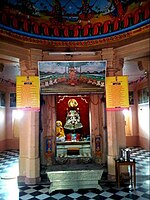Our website is made possible by displaying online advertisements to our visitors.
Please consider supporting us by disabling your ad blocker.
Bhagat Pipa
Pipa | |
|---|---|
 Statue of Sant Pipa Bairagi | |
| Personal life | |
| Born | 5 April 1425 Gagron, Jhalawar, Rajasthan, India |
| Died | Unknown (~early 15th century)[1] |
| Spouse | Rani Sita |
| Children | Raja Dwarkanath |
| Known for | 1 verse in Guru Granth Sahib. |
| Other names | Raja Pipaji Pratap Singh Rao Pipa Sardar Pipa Sant Pipaji Pipa Bairagi |
| Occupation | Ruler of Gagron |
| Religious life | |
| Religion | Hinduism |
Bhagat Pipa (born 1425[2]) was a Rajput ruler of Gagaraungarh who abdicated the throne to become a Hindu mystic poet and saint of the Bhakti movement.[3][4] He was born in the Malwa region of North India (east Rajasthan) in approximately AD 1425.[5]

Pipa's exact date of birth and death are unknown, but it is believed that he lived in the late fourteenth and early fifteenth century.[1][6][7] Born into a warrior class and royal family, Pipa is described as an early Shaivism (Shiva) and Sakta (Durga) follower. Thereafter, he adopted Vaishnavism as a disciple of Ramananda, and later preached Nirguni (god without attributes) beliefs of life.[8][1] Bhagat Pipa is considered one of the earliest influential sants of the Bhakti movement in 15th century northern India.[8]
- ^ a b c Cite error: The named reference
ronaldwas invoked but never defined (see the help page). - ^ Datta, Amaresh (1987). Encyclopaedia of Indian Literature: A-Devo, Volume 1. Sahitya Akademi. p. 79. ISBN 9788126018031.
- ^ John Stratton Hawley (1987), Three Hindu Saints in Saints and Virtues, University of California Press, ISBN 978-0520061637, pages 63-66, 53-54
- ^ Max Arthur Macauliffe, The Sikh Religion: Its Gurus, Sacred Writings and Authors, Volume 6, Cambridge University Press, pages 111–119
- ^ "Search Gurbani : Gurbani Research Website".
- ^ James Lochtefeld, "Pipa", The Illustrated Encyclopedia of Hinduism, Vol. 2: N–Z, Rosen Publishing. ISBN 978-0823931798, page 511
- ^ Cite error: The named reference
nirmalwas invoked but never defined (see the help page). - ^ a b Cite error: The named reference
Lorenzenwas invoked but never defined (see the help page).
Previous Page Next Page


